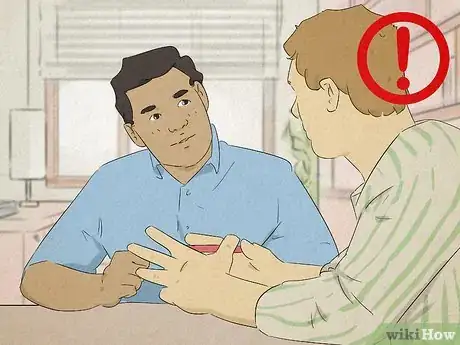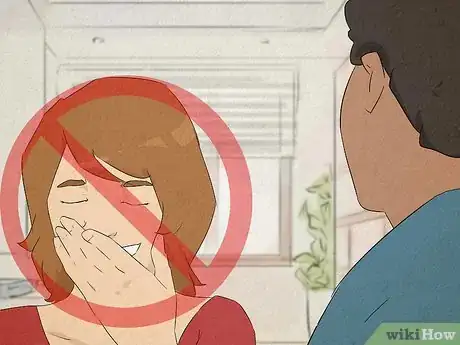This article was co-authored by Devin Fisher, CCC-SLP and by wikiHow staff writer, Jennifer Mueller, JD. Devin Fisher is a Speech-Language Pathologist based in Las Vegas, Nevada. Devin specializes in speech and language therapy for individuals with aphasia, swallowing, voice, articulation, phonological social-pragmatic, motor speech, and fluency disorders. Furthermore, Devin treats cognitive-communication impairment, language delay, and Parkinson's Disease. He holds a BS and MS in Speech-Language Pathology from Fontbonne University. Devin also runs a related website and blog that offers speech-language therapy resources and information for clinicians and clients.
There are 10 references cited in this article, which can be found at the bottom of the page.
wikiHow marks an article as reader-approved once it receives enough positive feedback. In this case, 100% of readers who voted found the article helpful, earning it our reader-approved status.
This article has been viewed 96,950 times.
Stuttering affects a person's ability to speak smoothly—but it doesn't mean that they have any problem thinking or don't have valuable things to say! If you don't have a lot of experience talking to someone who stutters, you might find it frustrating at first or be worried about hurting the person's feelings. Here, we've compiled some tips on listening and conversing with a person who stutters so you can be supportive.[1]
Steps
Expert Q&A
Did you know you can get expert answers for this article?
Unlock expert answers by supporting wikiHow
-
QuestionHow can I help make things easier for my child?
 Ran D. Anbar, MD, FAAPDr. Ran D. Anbar is a pediatric medical counselor and is board certified in both pediatric pulmonology and general pediatrics, offering clinical hypnosis and counseling services at Center Point Medicine in La Jolla, California and Syracuse, New York. With over 30 years of medical training and practice, Dr. Anbar has also served as a professor of pediatrics and medicine and the Director of pediatric pulmonology at SUNY Upstate Medical University. Dr. Anbar holds a BS in Biology and Psychology from the University of California, San Diego and an MD from the University of Chicago Pritzker School of Medicine. Dr. Anbar completed his pediatric residency and pediatric pulmonary fellowship training at the Massachusetts General Hospital and Harvard Medical School and is also a past President, fellow and approved consultant of the American Society of Clinical Hypnosis.
Ran D. Anbar, MD, FAAPDr. Ran D. Anbar is a pediatric medical counselor and is board certified in both pediatric pulmonology and general pediatrics, offering clinical hypnosis and counseling services at Center Point Medicine in La Jolla, California and Syracuse, New York. With over 30 years of medical training and practice, Dr. Anbar has also served as a professor of pediatrics and medicine and the Director of pediatric pulmonology at SUNY Upstate Medical University. Dr. Anbar holds a BS in Biology and Psychology from the University of California, San Diego and an MD from the University of Chicago Pritzker School of Medicine. Dr. Anbar completed his pediatric residency and pediatric pulmonary fellowship training at the Massachusetts General Hospital and Harvard Medical School and is also a past President, fellow and approved consultant of the American Society of Clinical Hypnosis.
Pediatric Pulmonologist & Medical Counselor
-
QuestionWhat do you say to someone who stutters?
 Devin Fisher, CCC-SLPDevin Fisher is a Speech-Language Pathologist based in Las Vegas, Nevada. Devin specializes in speech and language therapy for individuals with aphasia, swallowing, voice, articulation, phonological social-pragmatic, motor speech, and fluency disorders. Furthermore, Devin treats cognitive-communication impairment, language delay, and Parkinson's Disease. He holds a BS and MS in Speech-Language Pathology from Fontbonne University. Devin also runs a related website and blog that offers speech-language therapy resources and information for clinicians and clients.
Devin Fisher, CCC-SLPDevin Fisher is a Speech-Language Pathologist based in Las Vegas, Nevada. Devin specializes in speech and language therapy for individuals with aphasia, swallowing, voice, articulation, phonological social-pragmatic, motor speech, and fluency disorders. Furthermore, Devin treats cognitive-communication impairment, language delay, and Parkinson's Disease. He holds a BS and MS in Speech-Language Pathology from Fontbonne University. Devin also runs a related website and blog that offers speech-language therapy resources and information for clinicians and clients.
Speech Language Pathologist
-
QuestionWhy do I stutter more when I'm nervous?
 Devin Fisher, CCC-SLPDevin Fisher is a Speech-Language Pathologist based in Las Vegas, Nevada. Devin specializes in speech and language therapy for individuals with aphasia, swallowing, voice, articulation, phonological social-pragmatic, motor speech, and fluency disorders. Furthermore, Devin treats cognitive-communication impairment, language delay, and Parkinson's Disease. He holds a BS and MS in Speech-Language Pathology from Fontbonne University. Devin also runs a related website and blog that offers speech-language therapy resources and information for clinicians and clients.
Devin Fisher, CCC-SLPDevin Fisher is a Speech-Language Pathologist based in Las Vegas, Nevada. Devin specializes in speech and language therapy for individuals with aphasia, swallowing, voice, articulation, phonological social-pragmatic, motor speech, and fluency disorders. Furthermore, Devin treats cognitive-communication impairment, language delay, and Parkinson's Disease. He holds a BS and MS in Speech-Language Pathology from Fontbonne University. Devin also runs a related website and blog that offers speech-language therapy resources and information for clinicians and clients.
Speech Language Pathologist
Warnings
- Don't turn stuttering into the punchline of a joke, especially when you're within earshot of a person who stutters. It can be really tough to hear someone you think is a friend turn your challenge into a joke.[18]⧼thumbs_response⧽
- Never criticize the person for stuttering—it isn't something they can help. If you're critical, they'll avoid talking to you in the future.[19]⧼thumbs_response⧽
References
- ↑ https://www.nhs.uk/conditions/stammering/
- ↑ https://www.hacw.nhs.uk/download.cfm?doc=docm93jijm4n1519.pdf&ver=2814
- ↑ https://actionforstammeringchildren.org/about-stammering/tips/
- ↑ https://actionforstammeringchildren.org/about-stammering/tips/
- ↑ https://stamma.org/about-stammering/talking-someone-who-stammers
- ↑ https://patient.info/brain-nerves/stammer-stutter#nav-3
- ↑ https://stamma.org/about-stammering/talking-someone-who-stammers
- ↑ https://familydoctor.org/condition/stuttering/
- ↑ https://www.nhsggc.org.uk/media/255705/stammering-information-advice-for-teachers-the-older-school-aged-child.pdf
- ↑ https://patient.info/brain-nerves/stammer-stutter#nav-3
- ↑ https://familydoctor.org/condition/stuttering/
- ↑ Devin Fisher, CCC-SLP. Speech Language Pathologist. Expert Interview. 15 January 2021.
- ↑ https://stamma.org/about-stammering/talking-someone-who-stammers
- ↑ https://www.nhsggc.org.uk/media/255705/stammering-information-advice-for-teachers-the-older-school-aged-child.pdf
- ↑ https://www.asha.org/public/speech/disorders/stuttering/
- ↑ https://www.schn.health.nsw.gov.au/fact-sheets/stuttering
- ↑ Devin Fisher, CCC-SLP. Speech Language Pathologist. Expert Interview. 15 January 2021.
- ↑ https://www.asha.org/public/speech/disorders/stuttering/
- ↑ Devin Fisher, CCC-SLP. Speech Language Pathologist. Expert Interview. 15 January 2021.






















-Step-17-Version-2.webp)

















































Medical Disclaimer
The content of this article is not intended to be a substitute for professional medical advice, examination, diagnosis, or treatment. You should always contact your doctor or other qualified healthcare professional before starting, changing, or stopping any kind of health treatment.
Read More...